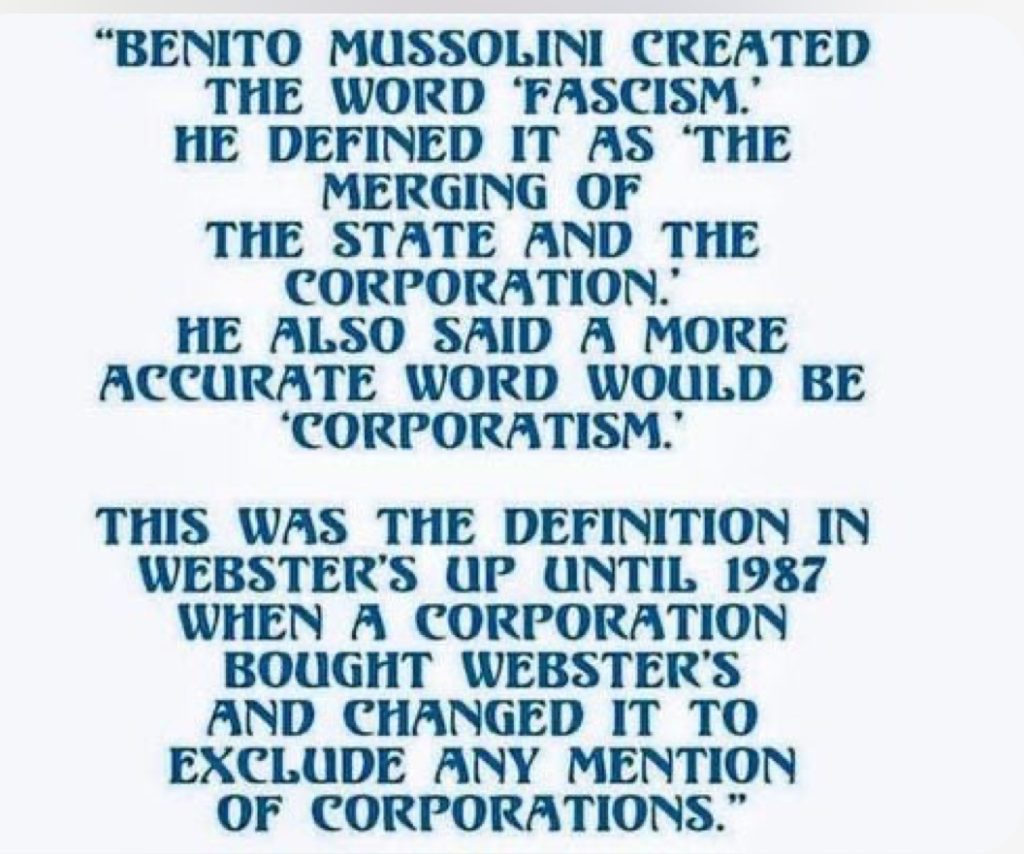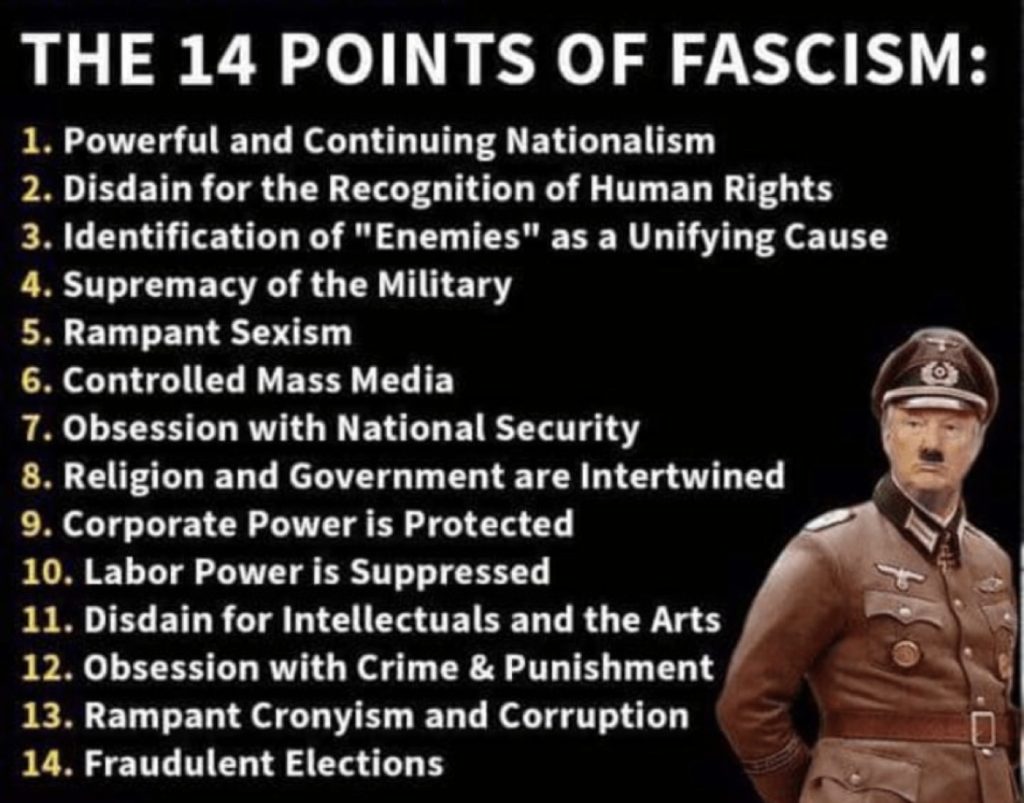For some there is a desire to serenade the idea of a far right takeover of our country so I delved into the past and the present to understand what people can expect on a day to day basis.
Far-right governments have left an indelible mark on the political, social, and economic landscapes of numerous countries throughout history. Characterised by extreme nationalism, authoritarian tendencies, xenophobia, and a resistance to progressive social policies, far-right regimes often prioritise national identity and security over individual freedoms and inclusivity. Understanding the potential consequences of far-right governance requires an examination of historical precedents and the ideologies that underpin these regimes. This article will explore the impact of far-right governments, drawing on historical examples, and will discuss how young people can critically engage with and recognise the realities of fascism and extreme nationalism.

Characteristics of Far-Right Governments
Far-right governments typically share several key characteristics:
- Authoritarianism: Centralisation of power in a single leader or ruling party, often with a disdain for democratic processes and institutions.
- Nationalism: An emphasis on national identity and unity, frequently coupled with exclusionary policies towards minorities and immigrants.
- Xenophobia and Racism: Policies and rhetoric that promote discrimination against ethnic, religious, or cultural groups perceived as “other.”
- Suppression of Dissent: Restriction of freedom of speech, press, and assembly, with heavy censorship and punishment for those who oppose the regime.
- Militarism: A strong focus on military strength and readiness, often at the expense of social and economic development.
Historical Examples of Far-Right Governments
Nazi Germany (1933-1945)
Nazi Germany, under the leadership of Adolf Hitler, represents one of the most infamous far-right regimes in history. The Nazi government was marked by extreme nationalism, militarism, and a genocidal racial ideology. Key impacts included:
- Authoritarian Rule: Hitler’s regime abolished democratic institutions and established a totalitarian state.
- Racial Policies: The implementation of the Nuremberg Laws, which stripped Jews of their rights, and the horrific genocide known as the Holocaust.
- War and Expansionism: Aggressive expansionist policies led to World War II, causing widespread devastation and loss of life.
- Youth Recruitment: The Hitler Youth organisation indoctrinated young Germans with Nazi ideology and prepared them for military service, leading many to fight and die for the regime.
Fascist Italy (1922-1943)
Under Benito Mussolini, Italy became a fascist state characterised by:
- Centralised Power: Mussolini dismantled democratic institutions and established a dictatorship.
- Nationalism: Promoted the idea of a “New Roman Empire” and pursued aggressive foreign policies.
- Suppression of Opposition: Use of secret police and propaganda to silence dissent and control the population.
- Youth Recruitment: The Balilla and later the Gioventù Italiana del Littorio organisations were used to militarise young Italians and instill fascist values, leading many to serve in Mussolini’s wars.
Francoist Spain (1939-1975)
Francisco Franco’s dictatorship in Spain exemplified far-right authoritarianism with:
- Military Dictatorship: Franco ruled with an iron fist, utilising military power to maintain control.
- Repression: Brutal suppression of political opponents, censorship, and human rights abuses.
- Cultural Nationalism: Promotion of Spanish nationalism and suppression of regional identities and languages.
- Youth Recruitment: Franco’s regime encouraged youth to join the Falange Española and other nationalist groups, often leading to their participation in military and paramilitary activities.
Contemporary Far-Right Governments
While the most extreme examples of far-right governments are historical, contemporary politics still sees the rise of far-right parties and leaders. Examples include:
Hungary under Viktor Orbán
- Centralisation of Power: Orbán’s government has weakened democratic institutions and consolidated power.
- Anti-Immigrant Policies: Strict anti-immigrant and anti-refugee policies, often accompanied by xenophobic rhetoric.
- Media Control: Increased control over the media, limiting press freedom and dissent.
- Youth Recruitment: Through nationalist youth organisations and education reforms, Orbán’s government promotes a militaristic and nationalistic ideology among young Hungarians.
Poland under Law and Justice Party (PiS)
- Judicial Reforms: Attempts to control the judiciary and undermine the rule of law.
- Nationalism: Strong nationalist rhetoric and policies, including resistance to EU migrant quotas.
- Social Conservatism: Opposition to LGBTQ+ rights and promotion of traditional family values.
- Youth Recruitment: Similar to Hungary, Poland’s government uses educational policies and youth organizations to instill nationalist and conservative values in young people.
The Impact of Far-Right Governance
The effects of far-right governance on a country can be profound and multifaceted:
- Erosion of Democratic Institutions: Far-right governments often dismantle democratic checks and balances, leading to authoritarianism.
- Human Rights Abuses: Systematic suppression of political opposition, minority groups, and freedom of expression.
- Social Division: Promotion of nationalistic and exclusionary policies can lead to increased social tensions and conflict.
- Economic Consequences: Militarisation and isolationist policies can harm economic stability and international relations.
- Cultural Homogenization: Suppression of cultural diversity and imposition of a singular national identity.

Recruitment of Young People to the Military
Far-right governments often emphasise militarism and national defence, leading to the recruitment and indoctrination of young people into military service. This process involves several stages:
- Ideological Indoctrination: Young people are exposed to nationalist propaganda through education, media, and youth organisations. This indoctrination fosters a sense of duty and loyalty to the nation, preparing them for military service.
- Youth Organizations: Governments establish or co-opt youth organisations to instill militaristic and nationalistic values. Examples include the Hitler Youth in Nazi Germany and the Balilla in Fascist Italy.
- Mandatory Military Service: Many far-right regimes implement mandatory conscription, requiring young people to serve in the military for a specified period. This ensures a steady supply of soldiers for the regime’s military ambitions.
- Glorification of Military Service: Far-right governments often glorify military service as the highest form of patriotism, encouraging young people to enlist voluntarily. Propaganda emphasises heroism, honour, and the defense of the nation.
Recognising and Understanding Far-Right Ideologies
For young people, understanding the realities of far-right ideologies such as fascism and extreme nationalism is crucial. Here are some ways they can engage with and recognise these ideologies:
- Education: Schools and universities should include comprehensive curricula on the history and consequences of far-right regimes. Courses in history, political science, and sociology can provide critical insights.
- Media Literacy: Developing skills to critically analyse media and recognise propaganda and biased information. Understanding how media can be manipulated by far-right groups is essential.
- Engagement with History: Visiting museums, historical sites, and memorials dedicated to victims of far-right regimes. Engaging with survivor testimonies and historical documentation.
- Participation in Civic Life: Encouraging young people to participate in democratic processes, such as voting, activism, and community organising, to counteract far-right narratives.
- Dialogue and Debate: Promoting open discussions and debates about political ideologies, human rights, and democracy. Creating safe spaces for diverse voices and perspectives.
- Utilising Technology: Leveraging social media and digital platforms to access diverse viewpoints and information, while being mindful of misinformation and echo chambers.
Far-right governments have had, and continue to have, profound impacts on countries worldwide. The lessons from historical and contemporary examples highlight the dangers of extreme nationalism, authoritarianism, and xenophobia. For young people, understanding these ideologies and their consequences is vital for fostering a more inclusive, democratic, and just society. By engaging with history, media, and civic life, they can better recognise and counteract the harmful effects of far-right governance. Additionally, understanding the mechanisms of youth recruitment into militaristic ideologies can help prevent the manipulation and exploitation of young people in the service of authoritarian regimes.
Imagine the worse case scenario

For some they will only learn these horrors through experience. For others they can do their best to educate them before it is too late. Some may listen whilst others will have to suffer and imprison others in their suffering first. Time to choose.
KEEP US ALIVE and join us in helping to bring reality and decency back by SUBSCRIBING to our Youtube channel: https://www.youtube.com/channel/UCQ1Ll1ylCg8U19AhNl-NoTg AND SUPPORTING US where you can: Award Winning Independent Citizen Media Needs Your Help. PLEASE SUPPORT US FOR JUST £2 A MONTH https://dorseteye.com/donate/







